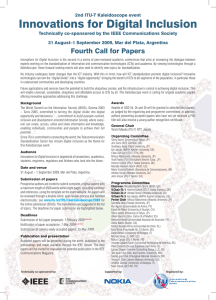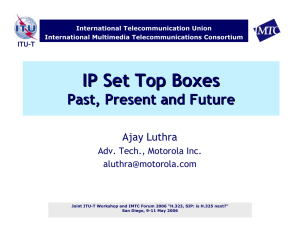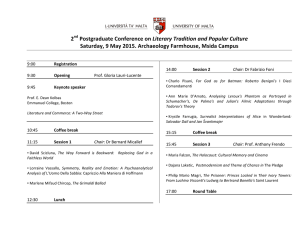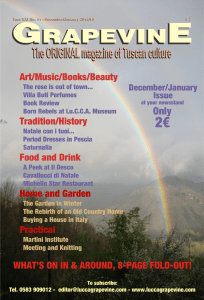Experimental results Célio Fonseca Barbosa International Telecommunication Union
advertisement
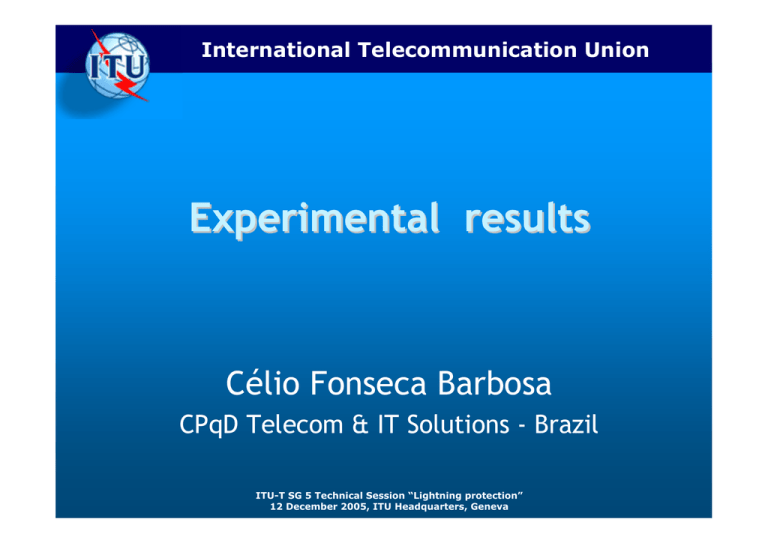
International Telecommunication Union Experimental results Célio Fonseca Barbosa CPqD Telecom & IT Solutions - Brazil ITU-T SG 5 Technical Session “Lightning protection” 12 December 2005, ITU Headquarters, Geneva Contents ITU-T o Introduction o The test site o Results based on line experiments o Results based on RBS experiments o Conclusions dates ITU-T SG 5 Technical Session “Lightning Protection“ 12 December 2005, ITU Headquarters Geneva, Switzerland 2 The Test Site ITU-T dates LOCATION: National Institute of Space Research - INPE Cachoeira Paulista - São Paulo - BRAZIL ITU-T SG 5 Technical Session “Lightning Protection“ 12 December 2005, ITU Headquarters Geneva, Switzerland 3 The Test Site PARTICIPANTS ITU-T dates o TELECOM EXPERIMENTS • CPqD Telecom & IT Solutions - Brazil • France Télécom R&D - France • Telstra Corp. – Australia • Federal University of Minas Gerais – Brazil • State University of Campinas – Brazil o OTHER EXPERIMENTS • Indelec – France • National Inst. of Space Research – Brazil • Hindelet - Brazil • Hydro-Québec - Canada • Catholic University of RS - Brazil ITU-T SG 5 Technical Session “Lightning Protection“ 12 December 2005, ITU Headquarters Geneva, Switzerland 4 The Test Site Satellite view ITU-T Ground based rocket platform Tower based rocket platform 2.6 km telecom lines 3.0 km dates ITU-T SG 5 Technical Session “Lightning Protection“ 12 December 2005, ITU Headquarters Geneva, Switzerland 5 Line Experiments - Rationale ITU-T Current propagation Coupling with the line Generation of EM fields dates ITU-T SG 5 Technical Session “Lightning Protection“ 12 December 2005, ITU Headquarters Geneva, Switzerland Surge propagation 6 Line Experiments - Rationale ITU-T The lines run from near the triggering area up to the Measuring Station (Shelter), which was kept operating 24 hours a day and remotely supervised by wireless modem. Thus, both natural and triggered lightning induced surges could be recorded. Triggering Lightning Area 2 Parallel lines 2.6 km long Cabinet Shelter dates ITU-T SG 5 Technical Session “Lightning Protection“ 12 December 2005, ITU Headquarters Geneva, Switzerland 7 Line Experiments - Rationale ITU-T The two lines are identical and have such a separation that: o They are close enough to be illuminated by the same electromagnetic fields produced by lightning discharges; o They are far enough so that their electromagnetic coupling can be kept under control. Therefore, when the lines have the same configuration, the same lightning surge is induced in both lines. Line 1 277 V peak Voltage base 100 V/div Line 2 277 V peak Time base 100 µs/div dates ITU-T SG 5 Technical Session “Lightning Protection“ 12 December 2005, ITU Headquarters Geneva, Switzerland 8 Line Experiments - Rationale ITU-T dates Comparing the lightning induced surges for different earthing configurations of the metallic sheath allows the evaluation of the shielding effect. Also, comparing the surges with and without SPD allows the evaluation of its protective effect. ITU-T SG 5 Technical Session “Lightning Protection“ 12 December 2005, ITU Headquarters Geneva, Switzerland 9 Line Experiments - Results ITU-T Line 1 earthed at far end (40 Ω) and near end (40 Ω). Line 2 earthed at far end (40 Ω) and open at near end. Shielding effect = 156 / 1100 = 0.14 Line 1 156 V peak Line 2 1100 V peak dates ITU-T SG 5 Technical Session “Lightning Protection“ 12 December 2005, ITU Headquarters Geneva, Switzerland 10 Line Experiments - Results ITU-T Peak values are determined by the travelling wave regime, followed by the natural oscillations of the line. Line 1 Line 2 dates ITU-T SG 5 Technical Session “Lightning Protection“ 12 December 2005, ITU Headquarters Geneva, Switzerland 11 Line Experiments - Results ITU-T The ratio between the open circuit voltage in Line 2 to the current to ground in Line 1 is very close to the surge impedance of the line (Z = 440 Ohms). Line 2 Line 1 dates ITU-T SG 5 Technical Session “Lightning Protection“ 12 December 2005, ITU Headquarters Geneva, Switzerland 12 Line Experiments - Results ITU-T The wave shape of lightning induced surges due to the return and subsequent strokes are similar, indicating that it’s determined by the relative position of the discharge with respect to the line. Line 1 Line 2 dates ITU-T SG 5 Technical Session “Lightning Protection“ 12 December 2005, ITU Headquarters Geneva, Switzerland 13 Line Experiments - Results ITU-T Applying travelling wave analysis to the line configuration leads to the following expression for the shielding factor, considering the coupling between the lines: R (1 + β )(1 + k ) + [(1 − β )(1 − k )] Z η= 2(1 + kβ ) Where: β = (Re – Z)/(Re + Z) is the reflection coefficient for Line 1 k is the ratio between the mutual and self line impedances Z is the line self impedance R is the sheath resistance (R << Z) Re is the earthing resistance at the near end dates ITU-T SG 5 Technical Session “Lightning Protection“ 12 December 2005, ITU Headquarters Geneva, Switzerland 14 Line Experiments - Results ITU-T The comparison between the measured and calculated shielding factor values is shown in table below: Earthing resistance (Ω) Shielding factor ηe Far end Near end Measured Calculated 40 ∞ 1,00 1,00 40 40 0,14 0,14 40 80 0,26 0,23 80 40 0,13 0,14 Measured values are based on the average shielding factors taken from 260 pairs of oscillograms. dates ITU-T SG 5 Technical Session “Lightning Protection“ 12 December 2005, ITU Headquarters Geneva, Switzerland 15 Line Experiments - Results ITU-T • The shielding effect related to earth provided by the telecommunication cable’s metallic sheath can be modelled by the travelling wave theory. • For a stand alone line the shielding factor for a sheath earthing at the line end is given by: ηe = Re / (Re + Z) • If the sheath earthing is made along the line (away from the line ends), it’s given by: ηe = 2Re / (2Re + Z) • This result has been incorporated into the Rec.K.46 “Protection of telecommunication lines with metallic symmetric conductors against lightning induced surges”. dates ITU-T SG 5 Technical Session “Lightning Protection“ 12 December 2005, ITU Headquarters Geneva, Switzerland 16 Line Experiments - Results ITU-T Comparison between the shielding effect related to earth calculated by different documents (Z = 400 Ω): Earthing resistance at the line end (Ω) 5 ITU-T Rec.K.46 Rusck Eq.51 IEC 62305-2 0,012 0,012 0,500 10 0,024 0,024 0,500 30 0,070 0,070 0,500 60 0,130 0,130 0,500 100 0,200 0,200 0,500 Shielding factor related to the earth • In IEC 62305-2 (Table B7) this shielding factor is called “shield not bonded to equipotential bonding bar to which equipment is connected” and it’s assumed as 0,5 independently of the earthing resistance value. • In Rusck’s Equation 51 the sheath height was considered equal to the conductor’s height and the mutual impedance equal to the self impedance, which is the case for a telecom cable. dates ITU-T SG 5 Technical Session “Lightning Protection“ 12 December 2005, ITU Headquarters Geneva, Switzerland 17 Line Experiments - Results ITU-T dates For the shielding factor related to the shield (ηs) the following experiment has been carried out: ITU-T SG 5 Technical Session “Lightning Protection“ 12 December 2005, ITU Headquarters Geneva, Switzerland 18 Line Experiments - Results ITU-T For the shielding factor related to the shield (ηs) the following equation gives a conservative value for the experimental results, where Rs is the resistance of the metallic sheath and Z is the line surge impedance: ηs = Rs / Z Values of ηs from the test lines (average from 46 pairs of oscillograms) dates Maximum 0.018 Minimum 0.0054 Average 0.013 Median 0.013 Theoretical 0.017 ITU-T SG 5 Technical Session “Lightning Protection“ 12 December 2005, ITU Headquarters Geneva, Switzerland 19 Line Experiments - Results ITU-T Comparison between the shielding effect related to shield calculated by different documents (Z = 400 Ω): Resistance of the cable sheath (Ω) Shielding factor related to the shield ITU-T Rec.K.46 IEC 62305-5 New Equation 2 0,042 0,042 0,005 5 0,098 0,098 0,013 10 0,18 0,18 0,025 30 0,40 0,40 0,075 60 0,57 0,57 0,15 Proposal: to revise ηs in Rec. K.46 dates ITU-T SG 5 Technical Session “Lightning Protection“ 12 December 2005, ITU Headquarters Geneva, Switzerland 20 Line Experiments - Results ITU-T The protective effect of SPD in an unshielded line was also analysed using the same approach as for the shielding factor. Example of voltages at line termination with and without SPD. dates ITU-T SG 5 Technical Session “Lightning Protection“ 12 December 2005, ITU Headquarters Geneva, Switzerland 21 Line Experiments - Results ITU-T • The protective effect provided by the installation of SPD at an unshielded telecommunication line can be modelled by the travelling wave theory. • The protective effect of a SPD installed at the line end is given by: KSPD = Re / (Re + Z) • If the sheath earthing is made along the line (away from the line ends), it’s given by: KSPD = 2Re / (2Re + Z) • These equations are also in line with Rusck’s Equation 178 and should be incorporated into the Rec.K.46. dates ITU-T SG 5 Technical Session “Lightning Protection“ 12 December 2005, ITU Headquarters Geneva, Switzerland 22 The Test Site – RBS Experiments ITU-T Buried Aerial dates ITU-T SG 5 Technical Session “Lightning Protection“ 12 December 2005, ITU Headquarters Geneva, Switzerland 23 The Test Site – RBS Experiments ITU-T dates ITU-T SG 5 Technical Session “Lightning Protection“ 12 December 2005, ITU Headquarters Geneva, Switzerland 24 RBS Experiments - Results ITU-T Current recorded into a short circuited loop: Loop dates ITU-T SG 5 Technical Session “Lightning Protection“ 12 December 2005, ITU Headquarters Geneva, Switzerland 25 RBS Experiments - Results ITU-T Lightning current Loop current 5 -2 2 6 10 14 18 22 26 30 0 -5 Current (A) -10 -15 -20 -25 -30 -35 Time (us) Same wave shape and peak values corresponding to the ratio between the loop self inductance and the mutual inductance between the lightning channel and the loop. Result incorporated into K.surge. dates ITU-T SG 5 Technical Session “Lightning Protection“ 12 December 2005, ITU Headquarters Geneva, Switzerland 26 RBS Experiments - Results ITU-T Diagram for the current measurement on the power conductors (2 phases and 1 neutral) dates ITU-T SG 5 Technical Session “Lightning Protection“ 12 December 2005, ITU Headquarters Geneva, Switzerland 27 RBS Experiments - Results 0,5 ITU-T 0 Current (kA) 0 10 20 30 40 50 60 -0,5 Phases -1 -1,5 Neutral -2 Time (us) Currents measurement on the power conductors dates ITU-T SG 5 Technical Session “Lightning Protection“ 12 December 2005, ITU Headquarters Geneva, Switzerland 28 RBS Experiments - Results ITU-T Parameter Lightning Front time Time to half value Peak value Average di/dt Maximum di/dt dates Phase Neutral stroke 0,3 µs 10 µs 20 µs 25 µs 37 µs >>50 µs 11.7 kA 0.95 kA 1.9 kA 39 kA/ µs 95 A/ µs 95 A/ µs 270 kA/ µs 1.7 kA/ µs 2.8 kA/ µs (only at the top) ITU-T SG 5 Technical Session “Lightning Protection“ 12 December 2005, ITU Headquarters Geneva, Switzerland 29 RBS Experiments - Results ITU-T The power conductors carried about 1/3 of the total lightning current The average di/dt on the phase conductor is only 0.24% of the average di/dt of the stroke current dates ITU-T SG 5 Technical Session “Lightning Protection“ 12 December 2005, ITU Headquarters Geneva, Switzerland 30 RBS Experiments - Results ITU-T V = V p + Le . di dt V = inductive voltage drop on SPD’s conductors di/dt = time derivative of the current Vp = SPD’s residual voltage Le = inductance of SPD’s conductors dates ITU-T SG 5 Technical Session “Lightning Protection“ 12 December 2005, ITU Headquarters Geneva, Switzerland 31 RBS Experiments - Results ITU-T 0,10 0,00 7,0 7,1 7,2 7,3 Current (kA) -0,10 -0,20 -0,30 -0,40 -0,50 -0,60 Time (us) Zoom on the beginning of the neutral current where the highest di/dt is observed dates ITU-T SG 5 Technical Session “Lightning Protection“ 12 December 2005, ITU Headquarters Geneva, Switzerland 32 RBS Experiments - Results ITU-T R ⎛ di S ⎞ ⎛ di P ⎞ = ⎜ ⎟ ⎜ ⎟ dt dt ⎝ ⎠ MAX (R + Z ) ⎝ ⎠ AVE (diP/dt)MAX (diS/dt)AVE R Z is the maximum di/dt on the power line; is the average di/dt of the lightning stroke = 39 kA/µs; is the earth resistance of the installation = 20 Ω; is the surge impedance of the power line = 110 Ω; (diP/dt)MAX = 6.0 kA/µs calculated by the equation above (diP/dt)MAX = 6.2 kA/µs measured at the site Note: update K.56 dates ITU-T SG 5 Technical Session “Lightning Protection“ 12 December 2005, ITU Headquarters Geneva, Switzerland 33 RBS Experiments - Results ITU-T Other results are available, such as: o Surge voltage induced by lightning into an open loop o Effect of earthing the bending point of feeder cables in a radio base station (RBS) o Energy dissipated by SPD installed at power lines of an installation struck by lightning o Voltages at the ports of equipment inside the RBS New experiments are under development concerning the effect of protective measures against lightning discharges applied to buried telecom cables. dates ITU-T SG 5 Technical Session “Lightning Protection“ 12 December 2005, ITU Headquarters Geneva, Switzerland 34 Conclusions ITU-T o o dates The experimental data from the test site is an important source of information for the development of standards on lightning protection. The data available shall be considered in order to revise the existing standards and to develop new ones. ITU-T SG 5 Technical Session “Lightning Protection“ 12 December 2005, ITU Headquarters Geneva, Switzerland 35
